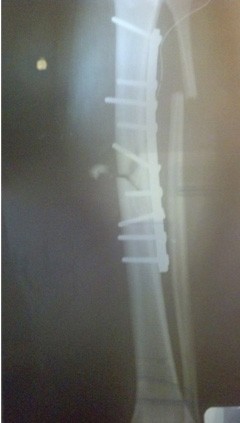On their last night in a small village in Honduras, three doctors received a last-minute call detailing an orthopedic trauma injury due to a motorcycle accident. The 24-year-old patient snapped his shinbone in half.
Luckily for the patient, his attending physicians included UA orthopedic surgeon Dr. Joseph Sheppard, who travels each year with a team of residents and surgical staff to the town of San Pedro Sula in Honduras. This year, undergraduate students are also being encouraged to apply to participate in the medical mission.
“I would recommend undergrad and graduate students who are interested in orthopedics or medicine to do something overseas because that will help their application,” said Dr. Bobby Dezfuli, a fifth-year orthopedic surgery resident. “That’s a great experience to set you apart, but it also makes you want to know if you would like to continue in medicine.”
Dezfuli and third-year resident Dr. Chris Minnock participated in this year’s medical mission with Sheppard, who has been making the annual trip for nine years because of the high demand for orthopedic surgical services in Honduras.
“We see things over there that, in five years of training, you don’t see here in the U.S.,” Dezfuli said.
There are only a few orthopedic surgeons in Honduras, the majority of whom are located in two major cities: San Pedro Sula and Tegucigalpa. These surgeons are not equipped with the same specialized surgical skills Sheppard and his residents have, Minnock said.
“We have the opportunity to treat a lot of the patients who wouldn’t otherwise have specialty orthopedic care,” Dezfuli said. “Unfortunately, the care that is there is usually not standardized.”
The UA medical team, comprised of physicians, medical school residents, anesthesiologists, scrub technicians and nurses, worked together to treat 30 to 40 patients per day and, at times, performed surgery until 11 p.m., Dezfuli said.
One of the team’s biggest obstacles was overcoming shortages of orthopedic surgical supplies, such as screws, plates and rods, all of which are necessary to align broken bones. The hospital Sheppard’s team operated from, Hospital Centro Socorro De Lo Alto, not only had a low supply of these parts, but the materials they did have were generations older than those used in the U.S., Dezfuli said.
The team also had to navigate through surgery without the use of an X-ray, which is commonly used during orthopedic surgeries in the U.S., Dezfuli said.
“You see a lot of poverty, and it is sobering to appreciate the things you have,” he said.
Students interested in applying should email Sheppard’s administrative assistant, Phyllis Goldstein at pgoldstein@ortho.arizona.edu or email info@ortho.arizona.edu.









